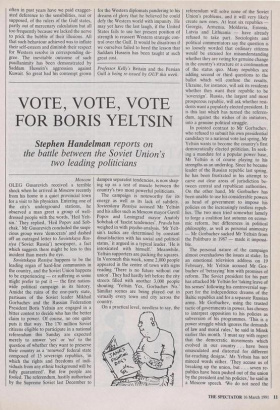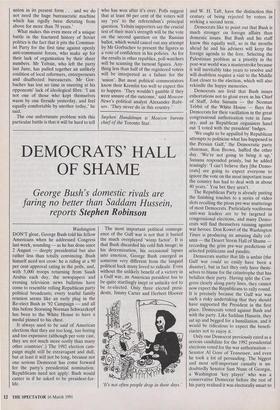VOTE, VOTE, VOTE FOR BORIS YELTSIN
Stephen Handelman reports on
the battle between the Soviet Union's two leading politicians
Moscow OLEG Gusarevich received a terrible shock when he arrived in Moscow recently from his home in a quiet provincial town for a visit to his physician. Entering one of the city's underground stations, he observed a man greet a group of well- dressed people with the words, `Heil Yelt- sin.' They replied, 'Heil Popov and Sob- chak.' Mr Gusarevich concluded the suspi- cious group were 'democrats' and dashed off an outraged letter to Sovietskaya Ros- siya ('Soviet Russia') newspaper, a fact which suggests there might be less to this incident than meets the eye.
Sovietskaya Rossiya happens to be the leading organ of hard-line communists in the country, and the Soviet Union happens to be experiencing — or suffering as some might prefer to put it — the first nation- wide political campaign in its history. Amidst the ruins of the one-party state, partisans of the Soviet leader Mikhail Gorbachev and the Russian Federation President Boris Yeltsin are engaged in a bitter contest to decide who has the better claim to power. Of course, no one quite puts it that way. The 170 million Soviet citizens eligible to participate in a national referendum this Sunday are expected merely to answer `yes' or 'no' to the question of whether they want to preserve their country as a 'renewed' federal state composed of 15 sovereign republics, 'in which the rights and freedoms of indi- viduals from any ethnic background will be fully guaranteed'. But few people are fooled. The referendum, hastily authorised by the Supreme Soviet last December to dampen separatist tendencies, is now shap- ing up as a test of muscle between the country's two most powerful politicians. The campaign is noteworthy for its energy as well as its lack of subtlety. Sovietskaya Rossiya accused Mr Yeltsin and his allies such as Moscow mayor Gavril Popov and Leningrad mayor Anatoly Sobchak of 'fascist tendencies'. Pravda has weighed in with psycho-analysis. 'Mr Yelt- sin's tactics are determined by constant dissatisfaction with his social and political status,' it argued in a typical leader. 'He is intoxicated with himself.' Meanwhile, Yeltsin supporters are packing the squares. In Voronezh this week, some 2,000 people appeared in the centre of town with signs reading 'There is no future without our union'. They had hardly left before the city streets filled with another 3,000 people shouting `Yeltsin Yes, Gorbachev No.' Similiar scenes are being played out in virtually every town and city across the country.
On a practical level, needless to say, the referendum will solve none of the Soviet Union's problems, and it will very likely create new ones. At least six republics — Georgia, Armenia, Moldavia, Estonia, Latvia and Lithuania — have already refused to take part. Sociologists and political commentators say the question is so loosely worded that ordinary citizens would be excused for misunderstanding whether they are voting for genuine change in the country's structure or a continuation of the status quo. Many republics are adding second or third questions to the ballot which will confuse the results. Ukraine, for instance, will ask its residents whether they want their republic to be 'sovereign'. Russia, the largest and most prosperous republic, will ask whether resi- dents want a popularly elected president. It is this last which has turned the referen- dum, against the wishes of its initiators, into a genuine political struggle.
In pointed contrast to Mr Gorbachev, who refused to submit his own presidential candidacy to a national vote last spring, Mr Yeltsin wants to become the country's first democratically elected politician. In seek- ing a mandate for a popular power base, Mr Yeltsin is of course playing to his strengths as an underdog. Since he became leader of the Russian republic last spring, he has been frustrated in his attempt to carve out clear areas of jurisdiction be- tween central and republican authorities. On the other hand, Mr Gorbachev has been unable to use his considerable powers as head of government to impose his policies on the increasingly restless repub- lics. The two men tried somewhat lamely to forge a coalition last autumn on econo- mic reform, but differences in political philosophy, as well as personal animosity — Mr Gorbachev sacked Mr Yeltsin from the Politburo in 1987 — made it impossi- ble.
The personal nature of the campaign almost overshadows the issues at stake. In an emotional television address on 19 February, Mr Yeltsin accused Mr Gor- bachev of 'betraying' him with promises of reform. The Soviet president for his part has attacked Mr Yeltsin for 'taking leave of his senses' following his controversial sup- port for the independence dreams of the Baltic republics and for a separate Russian army. Mr Gorbachev, using the trusted tactic of governments in power, has chosen to interpret opposition to his policies as subversion of his programmes. 'This is a power struggle which ignores the demands of law and moral rules,' he said in Minsk earlier this month. 'I must say with regret that the democratic movements which evolved in our country . . . have been emasculated and distorted for different far-reaching designs.' Mr Yeltsin has not minced words either. 'They accuse us of breaking up the union, but . . . seven re- publics have been pushed out of the union by the president and his policies,' he said in a Moscow speech. 'We do not need the union in its present form. . . and we do not need the huge bureaucratic machine which has rigidly been dictating from above for more than 70 years.'
What makes this even more of a unique battle in the fractured history of Soviet politics is the fact that it pits the Commun- ist Party for the first time against openly anti-communist forces, who make up for their lack of organisation by their sheer numbers. Mr Yeltsin, who left the party last June, has pulled together an unlikely coalition of local reformers, entrepreneurs and disaffected bureaucrats. Mr Gor- bachev has lost no time in sneering at his opponents' lack of ideological fibre. 'I am not one of those who kept themselves warm by one fireside yesterday, and feel equally comfortable by another today,' he said.
The one unfortunate problem with this particular battle is that it will be hard to tell who has won after it's over. Polls suggest that at least 60 per cent of the voters will say 'yes' to the referendum's principal question. Yeltsin supporters say the crucial test of their man's strength will be the vote on the second question on the Russian ballot, which would cancel out any attempt by Mr Gorbachev to present the figures as a vote of confidence in his policies. As for the results in other republics, poll-watchers will be scanning the turnout figures. Any- thing less than half of the registered voters will be interpreted as a failure for the 'union'. But most political commentators know their Kremlin too well to expect this to happen. 'They wouldn't gamble if they were unsure of the outcome,' said Moscow News's political analyst Alexander Rubt- soy. 'They never do in this country.'
Stephen Handelman is Moscow bureau chief of the Toronto Star.



























































 Previous page
Previous page